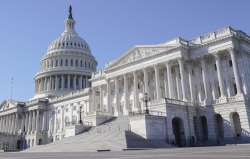Several US lawmakers write to Biden administration on suspending assistance to Pakistan
The lawmakers, led by Congresswoman Ilhan Omar, urged the Biden administration to withhold further security assistance until Pakistan conducts free and fair elections. They also expressed concerns over the strengthening of anti-blasphemy laws in Pakistan.

As many as 11 members of the US Congress have written to Secretary of State Antony Blinken urging the Biden administration to withhold further assistance to Pakistan until Islamabad restores constitutional order and holds free and fair elections.
According to a report by Dawn, the lawmakers requested a legal determination from the State Department to assess whether the security assistance from the US had facilitated human rights violations in Pakistan.
"We further request that future security assistance be withheld until Pakistan has moved decisively toward the restoration of Constitutional order, including by holding free and fair elections in which all parties are able to participate freely," they wrote to Blinken.
The letter also expressed concern over Pakistan's push to strengthen blasphemy laws with the Criminal Law (Amendment) Bill, saying that such changes would "tighten the nosse" around smaller religious groups and minorities. It highlighted that the bill was passed despite not being signed by the President.
Citing the August 16 incident, where an angry mob vandalised churches and set fire to homes of Christians in Jaranwala, the US lawmakers said, "Religious persecution remains rampant in Pakistan, and we are concerned about future restrictions on freedom of religion and belief should this Bill become law."
The move was initiated by Congresswoman Ilhan Omar, who is one of the champions of Muslim causes in the US Congress. Most of the lawmakers appealing against assistance to Pakistan are part of a group within Congress demanding a ceasefire in the Israel-Hamas war.
Religious freedom in Pakistan
The 2023 report of the US Commission on International Religious Freedom noted that Pakistan's religious freedom conditions had continued to deteriorate since last year.
"Religious minorities were subject to frequent attacks and threats, including accusations of blasphemy, targeted killings, lynchings, mob violence, forced conversions, sexual violence against women and girls, and desecration of houses of worship and cemeteries," it said.
The Commission further warned "harsh and discriminatory" anti-blasphemy laws had enabled radical Islamists to operate with "impunity, openly targeting religious minorities or those with differing beliefs, including nonbelievers".
"The new government under Prime Minister Shahbaz Sharif, which took office in April, weaponized the country’s blasphemy laws against former Prime Minister Imran Khan and his cabinet members. Religious minorities, however, were especially vulnerable to prosecution or violence based on blasphemy allegations in a society that has grown increasingly intolerant of religious diversity," it further said.
Despite caretaker PM Anwaar-ul-Haq Kakar's assurances, Pakistan's rigorous blasphemy laws have come under intense international scrutiny, which has targeted several minority communities of the country, particularly Hindus and Christians. The blasphemy law often provokes people to take matters into their own hands that have claimed the lives of many.
On August 16, a number of churches were vandalised by a mob that also looted valuables from houses that were abandoned by their owners after clerics incited the mob through announcements in mosques.
Reacting to the incident, the Biden administration in staunch words asserted Islamabad to investigate the incident and said, "resorting to violence or the use of threats is never an acceptable form of expression". It asked Pakistani authorities to conduct a free and fair investigation without hampering peaceful freedom of expression.
US assistance to Pakistan
Meanwhile, the cash-strapped Pakistan, which is heavily dependent on foreign assistance, is awaiting another tranche of US aid as the International Monetary Fund (IMF) revised its foreign loan requirements to $25 billion for the ongoing fiscal year.
The International Monetary Fund's delegation wrapped two-week-long talks with Pakistani officials on November 15 and announced that a staff-level agreement has been reached to enable it to release $700 million in the second tranche of an already agreed $3 billion loan.
Pakistan has already borrowed $6 billion in four months while it expects rollovers of $12.5 billion. The remaining needs are about $6.5 billion in addition to the efforts for timely securing the $12.5 billion debt rollovers, said the sources.
However, there will not be much respite for the government as the estimated available financing has also been cut by $3.7 billion because of the problems in acquiring loans through floating Eurobonds and from foreign commercial banks.
The finance ministry sources told the Express Tribune newspaper that the IMF had further reduced its economic growth projection for Pakistan to 2% from July's estimate of 2.5%.
Some of the gains that Pakistan will make because of the low imports are expected to be lost because of a reduction in the projected remittances. As against the old forecast of $32.9 billion, the IMF has now projected the foreign remittances at $29.4 billion -- a reduction of $3.5 billion, sources informed.
(with agency inputs)